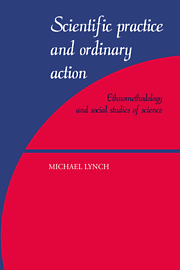Book contents
- Frontmatter
- Contents
- Acknowledgments
- Introduction
- 1 Ethnomethodology
- 2 The demise of the “old” sociology of science
- 3 The rise of the new sociology of scientific knowledge
- 4 Phenomenology and protoethnomethodology
- 5 Wittgenstein, rules, and epistemology's topics
- 6 Molecular sociology
- 7 From quiddity to haecceity: ethnomethodological studies of work
- Conclusion
- Name index
- Subject index
4 - Phenomenology and protoethnomethodology
Published online by Cambridge University Press: 03 December 2009
- Frontmatter
- Contents
- Acknowledgments
- Introduction
- 1 Ethnomethodology
- 2 The demise of the “old” sociology of science
- 3 The rise of the new sociology of scientific knowledge
- 4 Phenomenology and protoethnomethodology
- 5 Wittgenstein, rules, and epistemology's topics
- 6 Molecular sociology
- 7 From quiddity to haecceity: ethnomethodological studies of work
- Conclusion
- Name index
- Subject index
Summary
Edmund Husserl's ambition was to account for the achievements of the mathematical natural sciences without attributing those achievements to a naturalistic foundation, and his effort to do so created a legacy that ethnomethodology and the new sociology of science have taken up and transformed into empirical research programs. Few ethnomethodologists and sociologists of science today mention Husserl, perhaps because his effort to develop a “science” of the life-world based on a transcendental foundation was long ago repudiated in both Continental and Anglo-American philosophy. The disregard of Husserl is doubly unfortunate, however. First, the assumption that Husserl is irrelevant to contemporary research in ethnomethodology is belied by Garfinkel's continued injunctions to his students to “misread” Husserl from the standpoint of their projects at hand. Although Alfred Schutz is usually considered to be the phenomenologist most relevant to contemporary sociological research, an argument can be made that he delivers a rather weak version of the Husserlian critique of the natural sciences. Second, the problems that motivated Husserl's effort to build a transcendental foundation for his analysis of the life-world continue to haunt empirical sociology. Indeed, it can be argued that a tendency toward transcendental analysis remains implicit whenever social scientists (including ethnomethodologists) employ one or another variant of a distinction between “common sense” and “analytic” understandings of social practices.
In this chapter, I begin by treating Husserl's genealogy of natural science as a precursor to Michel Foucault's and Garfinkel's postphenomenological investigations.
- Type
- Chapter
- Information
- Scientific Practice and Ordinary ActionEthnomethodology and Social Studies of Science, pp. 117 - 158Publisher: Cambridge University PressPrint publication year: 1994

